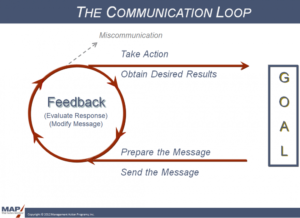Stop Self-Undermining Language
When you communicate with others, are you frequently using words that have the potential to destroy your power as a leader? Surprisingly, some of the language, we regularly use out of concern, politeness or fairness can strip our credibility as confident, effective and capable leaders. For example, when you’re talking in a staff meeting, maybe you’re repeatedly asking your audience, “Know what I mean?” or “Does that make sense?” Whether attached to beginning, end or the middle of our otherwise clear and concise sentences, these problem words or phrases can create unnecessary doubts and concerns. People question not only the leader but also whatever the leader is communicating, even advocating. Pay attention to what you specifically say and write. If it weakens your leadership and its potential, take corrective action and stop using this self-undermining language.
Using such language boils down to stopping or preventing a bad communication habit. For example, I have been known to say, “Does that make sense?” after I’ve obviously explained something clearly to my direct reports. Yet why am I asking them that question when I know it makes perfect sense? Do I not think I’m making sense? No, of course not. But this little, but bad habit could possibly get people thinking that I am not making sense after all or maybe I doubt my own abilities to communicate with clarity. A better approach is asking a more direct, productive question that removes any implication that I might not be making sense, such as, “Does anyone have any questions?”
Click here to download our free effective communication checklist.
It’s not always easy to break such communication habits, but it’s an important differentiator for great leaders who realize that what they truly think and believe must be aligned with what they write and say to others. When that alignment gets out of whack, confusion and misunderstandings can surface. Here are three tips for tackling this habit.Create awareness. Examine the reason for the habit. Be real with yourself, exploring “why” you’re communicating with such language on a regular basis. Do you truly not believe in yourself or what you’re doing? Are others around you speaking in the same way, and you’re just mirroring their detrimental dialogue? Don’t dwell or overthink the cause behind the habit, but do create some general awareness of why you’re doing it, and use that information to motivate you to change.Get help. Ask a mentor or trusted co-worker to help you spot when you’re using language that derails your power. Provide some examples such as mine above, as well as other common communication blunders, such as, “That OK?” vs. “Do you have any constructive feedback?” Or, “I actually like the project” vs. “I like the project.” And, “Sorry to bother you, but I need to chat” vs. “I need to talk if it’s convenient for you.” If anything you’re writing or saying to others comes across as if you’re “tiptoeing” around the conversation, apologizing, or feeling guilty, they will think you are doing just that! Another great tactic is to join a speakers’ organization, where you’ll have people critique your speaking and delivery for anything that detracts from the goal of clear, concise communication. They’ll help you eliminate fillers, annoying slang, and other common tendencies that demonstrate you’re having trouble connecting your mind to your mouth.
Know when it’s OK to break the rule. Communicating is an art and as with any good art, rules are made to be broken – on occasion. So if you’re regularly in the habit of asking, “Does anyone have any questions?” but you’re wanting to change your tone to elicit a different reaction for a reason, then maybe it’s occasionally better to say, “Am I making sense?” It might be that you want to come across as more “real” or “human” on a particularly sensitive subject, or maybe you’ve been a little too powerful lately and need to tone it down a notch today to get solid feedback and buy-in. The point with this language style is to keep it in check and use it sparingly for a specific purpose so that it doesn’t revert to or become a bad habit.What are some other common words or phrases that can derail a leader’s communication skills and power?



